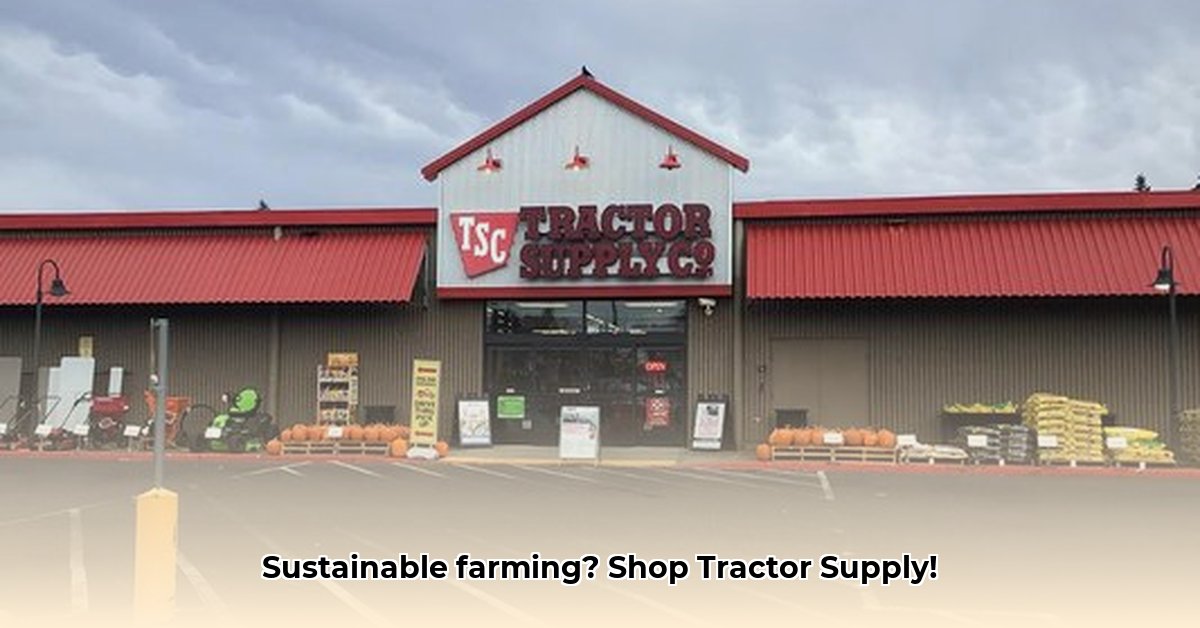
Tractor Supply Deer Park Washington: A Local Hub for Sustainable Agriculture
Tractor Supply Company (TSC) in Deer Park, Washington, serves as a crucial resource for local farmers, providing essential tools and supplies. This article examines TSC's role in supporting sustainable agricultural practices within the Deer Park community, exploring both its contributions and limitations. We'll delve into the product offerings, analyze the store's impact on environmental sustainability, and outline actionable steps for a greener future. For more information on other TSC locations, check out this example TSC location.
TSC's Product Offering and Accessibility: A Diverse Range for All Farmers
The Deer Park TSC offers a comprehensive range of products catering to farmers of all scales, from small-scale home gardeners to large-scale commercial operations. Need organic seeds for your vegetable patch? They've got you covered [1]. Seeking advanced irrigation systems to optimize water usage? They offer those as well. Looking for livestock feed ensuring animal welfare? They provide that too. This broad accessibility is particularly valuable in rural areas, saving farmers valuable time and resources by consolidating their supply needs in one convenient location. This one-stop shop model significantly reduces the logistical burden on farmers, contributing to greater efficiency. How impactful is this convenience for rural communities? A study is needed to quantify this benefit.
TSC's Impact on Sustainable Agriculture: A Balanced Perspective
TSC's contribution to sustainable agriculture presents a mixed picture. The store offers some products directly supporting eco-friendly practices. Organic seeds, for instance, are readily available, enabling farmers to pursue organic farming methods. Similarly, the store stocks water-efficient irrigation equipment and tools designed to minimize environmental impact. These offerings empower farmers to adopt sustainable practices and reduce their environmental footprint. However, a crucial limitation exists: TSC's commitment to sustainability isn't explicitly defined as a core company value. While providing sustainable options, they don't actively guide farmers towards making eco-friendly choices. Additionally, data transparency regarding the environmental impact of its supply chain remains limited. The simultaneous stocking of conventional (less sustainable) and sustainable products creates a potential challenge; farmers may inadvertently choose conventional products lacking clear information on their environmental impact.
Challenges and Opportunities: Navigating the Path to Sustainability
To further enhance TSC's contribution to sustainable agriculture in Deer Park, addressing specific challenges is paramount. Below is a risk assessment matrix outlining key challenges and mitigation strategies:
| Risk Factor | Description | Mitigation Strategies |
|---|---|---|
| Lack of TSC Sustainability Commitment | TSC's sustainability strategy lacks clear definition and communication. | Publicly define and communicate a comprehensive sustainability strategy; promote sustainable product lines. |
| Limited Data Transparency | Insufficient information about product sourcing and environmental impact. | Provide detailed product information, including supply chain details and environmental impact assessments. |
| Reliance on Conventional Inputs | The availability of conventional (less sustainable) products outweighs eco-friendly options. | Increase the visibility and availability of sustainable products; phase out or reduce the supply of less sustainable alternatives. |
| Consumer Awareness | Limited consumer awareness about TSC's sustainable offerings. | Implement targeted marketing and educational campaigns highlighting sustainable options. |
Stakeholder Perspectives: Collaborative Actions for a Sustainable Future
A collaborative approach involving all stakeholders is crucial for fostering sustainable agricultural practices:
| Stakeholder | Short-Term Goals | Long-Term Goals |
|---|---|---|
| TSC | Improved product labeling with clear environmental impact information; customer surveys on sustainability preferences. | Development of a comprehensive sustainability strategy encompassing supply chain transparency and investment in sustainable products. |
| Farmers | Increased adoption of sustainable products and regenerative agriculture practices. | Implementation of best practices for soil health, water conservation, and pest management. |
| Consumers | Active choice of sustainable products; advocacy for greater transparency from TSC. | Support for environmentally responsible farming practices and sustainable businesses. |
| Government Agencies | Provision of financial incentives for sustainable agriculture; support of research efforts. | Increased funding for agricultural research focused on sustainability and climate change resilience. |
Conclusion: A Shared Responsibility for a Greener Future
TSC in Deer Park plays a significant, albeit complex, role in supporting sustainable agriculture. Its wide product range creates accessibility, yet its lack of a clear sustainability strategy and limited data transparency hinder its full potential. For a truly sustainable future, collaborative efforts are needed. TSC must enhance its transparency and commitment to sustainability, while farmers and consumers need to make informed choices and support eco-friendly options. Government agencies can play a crucial role by providing incentives and promoting research. Together, we can build a more sustainable and resilient agricultural landscape in Deer Park and beyond.
Call to Action: Your Role in Shaping a Sustainable Future
You can actively support sustainable farming practices by:
- Choosing sustainable products at TSC: Carefully read product labels and prioritize certified organic options and those with reduced environmental impacts.
- Contacting TSC: Express your support for greater transparency and a stronger commitment to sustainability. Request more information about their supply chain and sustainability initiatives.
- Supporting local farmers: Source your food from farmers who adopt sustainable practices.
- Educate yourself and others: Learn more about sustainable agriculture and share your knowledge with your community.
By taking these actions, you become a vital part of building a greener future for Deer Park’s agricultural community.